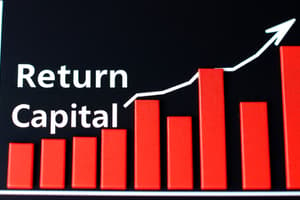Podcast
Questions and Answers
What is the main component of capital employed related to long term debt?
What is the main component of capital employed related to long term debt?
- Inventory
- Accounts payable
- Long term debt (correct)
- Accounts receivable
What is the typical maturity period for Long Term Debt?
What is the typical maturity period for Long Term Debt?
- Exactly five years
- Less than one year
- Exactly one year
- More than five years (correct)
Why do companies often pledge some of their assets as collateral when borrowing money through bond issues?
Why do companies often pledge some of their assets as collateral when borrowing money through bond issues?
- To decrease their total assets
- To increase their liabilities
- To reduce the risk for the lending institutions (correct)
- To avoid paying interest payments
What is a common example of a security pledged by companies when borrowing funds?
What is a common example of a security pledged by companies when borrowing funds?
What are the interest payments made throughout the life of a bond used for?
What are the interest payments made throughout the life of a bond used for?
How do interest rates on loans secured by real estate vary?
How do interest rates on loans secured by real estate vary?
What can bondholders do if a borrower fails to make periodic interest or principal payments?
What can bondholders do if a borrower fails to make periodic interest or principal payments?
How are long-term debts represented on financial statements?
How are long-term debts represented on financial statements?
Why do corporations report long-term debts on financial statements?
Why do corporations report long-term debts on financial statements?
What could happen if a corporation's stocks are worth less than what it owes to creditors?
What could happen if a corporation's stocks are worth less than what it owes to creditors?
Why is understanding how a company manages its long-term debt important?
Why is understanding how a company manages its long-term debt important?
What does Capital Employed encompass in a business?
What does Capital Employed encompass in a business?
Flashcards are hidden until you start studying
Study Notes
Capital Employed refers to all of the assets and liabilities used by a business in its operations. This figure includes both fixed assets like property, plant, and equipment, as well as current assets such as inventory, accounts receivable, etc., but excludes current liabilities like accounts payable. It is also known as Total Net Working Assets and reflects the total investment made by the company in its own resources. A key component of capital employed is Long Term Debt, which consists primarily of bonds and mortgages issued with maturities longer than one year.
Long Term Debt is money borrowed from lenders, usually banks, that will have to be repaid sometime in the future—with interest payments made along the way—and typically has a maturity period of more than five years. Interest rates on loans secured by real estate can vary depending upon the perceived riskiness of the loan and the state of the economy at the time it was made. In most cases, when companies borrow money from lending institutions through bond issues, they must pledge some of their assets as collateral. One common example of this type of security is a mortgage. When a company borrows funds, it becomes legally obligated to make regular interest payments throughout the life of the bond until the final payment of principal is due at the end of the stated maturity of the bond. If the borrower fails to make these periodic interest or principal payments, the bondholder can foreclose on any property used as collateral against the bond.
These types of debts do not represent cash on hand; rather, each represents a commitment for future cash outflows. As such, corporations are required to report them on financial statements so investors know how much they owe and have insight into potential risks associated with holding the securities. For instance, if a corporation's stocks are worth less than what it owes to creditors, the stockholders could lose everything. Therefore, having good information about corporate finances can help guide people toward wisely managed businesses where there is little chance of losing money.
In summary, Capital Employed encompasses all the assets and liabilities utilized by a business, including Long Term Debt, which is an important part of managing a firm's overall investments and commitments. Understanding how a company manages this aspect of its financing can offer valuable insights into whether it might face challenges meeting obligations down the road or may be a wise bet for those seeking stable returns over the long haul.
Studying That Suits You
Use AI to generate personalized quizzes and flashcards to suit your learning preferences.




